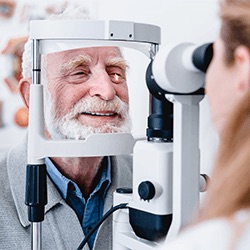Branch Retinal Vein Occlusion in St. Louis, MO
What Is Branch Retinal Vein Occlusion?
Branch retinal vein occlusion (BRVO) is a condition where one of the smaller veins in the retina becomes blocked, leading to a buildup of blood and fluid that can cause vision problems. This blockage can result from a blood clot or a narrowing of the vein, often associated with conditions like high blood pressure, diabetes, or glaucoma. At Retina Associates of St. Louis, we diagnose and treat branch retinal vein occlusion to help manage its symptoms and prevent further vision loss. Early detection and treatment are crucial to maintaining optimal eye health and vision. To learn more about BRVO, contact our office in St. Louis, MO.
How Is Branch Retinal Vein Occlusion Treated?
Branch retinal vein occlusion is treated through various methods that can be categorized into laser treatments, medications, and surgery. The specific treatment strategy varies from person to person, as not all treatments are effective for everyone. Your retinal specialist will determine a personalized treatment plan tailored to your condition. Laser treatments like focal laser can close off leaking blood vessels causing macular edema, while panretinal photocoagulation helps reduce neovascularization by improving retinal oxygenation. Medications, often injected around or into the eye, aim to decrease macular edema and block substances that promote leakage and new vessel growth. Early and appropriate treatment is essential for the best outcomes in managing BRVO and preserving vision.
What Are the Symptoms of Branch Retinal Vein Occlusion?
BRVO can cause various symptoms depending on the severity of the blockage. Common symptoms include:
- Sudden, painless vision loss or blurriness in one eye
- Distorted vision or difficulty seeing fine details
- Darker or blurry areas in the visual field
- Swelling or bleeding in the retina (in more severe cases)
If you experience any of these symptoms, it’s important to consult an eye care professional for diagnosis and treatment.
What Causes Branch Retinal Vein Occlusion?
Branch retinal vein occlusion occurs when one of the small veins carrying blood away from the retina becomes blocked, often due to a nearby artery pressing against it and causing turbulence or damage. This blockage can lead to a buildup of pressure, blood, and fluid in the retina, impairing vision.
What Are the Risk Factors of Branch Retinal Vein Occlusion?
Several factors can increase the risk of developing branch retinal vein occlusion, including:
- Age: BRVO is more common in individuals over the age of 50.
- High blood pressure: Elevated blood pressure can damage blood vessels and increase the likelihood of blockages.
- Diabetes: This condition affects blood vessel health, raising the risk of vein occlusion.
- Glaucoma: Increased pressure within the eye can contribute to vein compression and blockage.
- High cholesterol: Elevated cholesterol levels can lead to the narrowing and hardening of blood vessels.
- Smoking: Smoking damages blood vessels and can increase the chance of occlusions.
- Cardiovascular disease: Conditions affecting the heart and blood vessels are linked to an increased risk of BRVO.
- Clotting disorders: Conditions that affect normal blood clotting may raise the likelihood of vein occlusions.
If you have any of these risk factors, regular eye exams and proper management of underlying health conditions are essential to reducing your risk of BRVO and maintaining healthy vision.
What To Expect After Branch Retinal Vein Occlusion Treatment
After treatment for branch retinal vein occlusion, the outcomes depend on the severity of the condition, the type of treatment provided, and how early treatment begins. Many patients experience an improvement in vision, but it may take time for results to become noticeable. Some treatments may need to be repeated to maintain the results and prevent further complications. It’s important to attend all follow-up appointments at Retina Associates of St. Louis to monitor your progress and detect any signs of recurring issues. We can regularly assess your condition to determine if additional treatments are necessary.
Branch Retinal Vein Occlusion FAQ
Can BRVO cause permanent vision loss?
Yes, if left untreated, branch retinal vein occlusion (BRVO) can lead to permanent vision loss. The condition can cause macular edema, retinal swelling, or the development of abnormal blood vessels, all of which can severely impact vision. Early diagnosis and treatment are critical to managing the condition and reducing the risk of long-term damage.
Are there risk factors that increase the likelihood of developing BRVO?
Certain factors can increase your risk of developing branch retinal vein occlusion, including high blood pressure, diabetes, glaucoma, and age-related changes in the blood vessels. Regular eye exams and managing underlying health conditions can help lower your risk.
How is vision monitored after a BRVO diagnosis?
After a BRVO diagnosis, your retinal specialist will closely monitor your vision through regular check-ups and imaging tests, such as optical coherence tomography (OCT). These assessments help track changes in your retina, evaluate treatment effectiveness, and ensure prompt adjustments to your care plan if needed.
Branch Retinal Vein Occlusion Treatment
If you’re experiencing vision problems or have been diagnosed with branch retinal vein occlusion, it’s crucial to seek care immediately. At Retina Associates of St. Louis, our dedicated team offers advanced treatments tailored to your specific condition. Don’t let BRVO compromise your quality of life. Contact us in St. Louis, MO today to schedule a consultation and explore your personalized treatment options. Your vision is our priority.
*Individual results are not guaranteed and may vary from person to person. Images may contain models.




